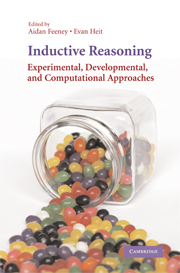Book contents
- Frontmatter
- Contents
- List of Figures
- List of Tables
- List of Contributors
- Preface
- 1 What Is Induction and Why Study It?
- 2 The Development of Inductive Reasoning
- 3 Interpreting Asymmetries of Projection in Children's Inductive Reasoning
- 4 Property Generalization as Causal Reasoning
- 5 Availability in Category-Based Induction
- 6 From Similarity to Chance
- 7 Theory-Based Bayesian Models of Inductive Reasoning
- 8 Use of Single or Multiple Categories in Category-Based Induction
- 9 Abductive Inference: From Philosophical Analysis to Neural Mechanisms
- 10 Mathematical Induction and Induction in Mathematics
- 11 Induction, Deduction, and Argument Strength in Human Reasoning and Argumentation
- 12 Individual Differences, Dual Processes, and Induction
- 13 Taxonomizing Induction
- Index
5 - Availability in Category-Based Induction
Published online by Cambridge University Press: 26 February 2010
- Frontmatter
- Contents
- List of Figures
- List of Tables
- List of Contributors
- Preface
- 1 What Is Induction and Why Study It?
- 2 The Development of Inductive Reasoning
- 3 Interpreting Asymmetries of Projection in Children's Inductive Reasoning
- 4 Property Generalization as Causal Reasoning
- 5 Availability in Category-Based Induction
- 6 From Similarity to Chance
- 7 Theory-Based Bayesian Models of Inductive Reasoning
- 8 Use of Single or Multiple Categories in Category-Based Induction
- 9 Abductive Inference: From Philosophical Analysis to Neural Mechanisms
- 10 Mathematical Induction and Induction in Mathematics
- 11 Induction, Deduction, and Argument Strength in Human Reasoning and Argumentation
- 12 Individual Differences, Dual Processes, and Induction
- 13 Taxonomizing Induction
- Index
Summary
Induction can be supported by many kinds of knowledge. To be effective, reasoning should be context sensitive; different kinds of knowledge should be selectively deployed in different situations. For example, in the domain of biology, when reasoning about the distribution of novel internal properties over species, taxonomic knowledge should be recruited since we know that taxonomic membership is not only related to perceptual similarity but is also a good predictor of shared unobservable anatomical features such as four-chambered hearts. However, when reasoning about the distribution of environmental toxins, ecological knowledge should be recruited since such a toxin would plausibly spread through an ecosystem. In this chapter, we address the factors that influence the recruitment of different kinds of knowledge in different contexts. We propose that different kinds of knowledge are differentially available across contexts. Using this concept of availability, we will address an array of experimental results, arguing for availability as a way to unite and explain a broad range of phenomena in category-based induction.
In a classic paper, Tversky and Kahneman (1973) discuss availability as a heuristic “by which people evaluate the frequency of classes or the likelihood of events” (p. 207). This involves estimating frequency or probability “by the ease with which instances or associations are brought to mind” (p. 208). As such, availability on this view is essentially a metacognitive heuristic by which information is judged more likely or plausible based on an estimate of the effort involved in retrieving the information; indeed, Tversky and Kahneman argue that “to assess availability it is not necessary to perform the actual operations of retrieval or construction. It suffices to assess the ease with which these operations could be performed” (p. 208).
- Type
- Chapter
- Information
- Inductive ReasoningExperimental, Developmental, and Computational Approaches, pp. 114 - 136Publisher: Cambridge University PressPrint publication year: 2007
- 8
- Cited by

